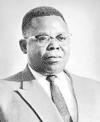- Kasavubu, Joseph
-
born 1910?, Tshela, Belgian Congodied March 24, 1969, BomaHe held a variety of administrative posts before agreeing to serve as president in Patrice Lumumba's government. When Katanga province under Moise Tshombe seceded a few days after independence, Kasavubu threw his support to Tshombe and, together with Col. J. Mobutu (see Mobutu Sese Seko), ousted Lumumba. Four years later a split between Kasavubu and Tshombe enabled Mobutu to seize control.
 KasavubuAP/Wide World Photos
KasavubuAP/Wide World Photos* * *
▪ president of Congoborn 1910?, Tshela, Belgian Congo [now Democratic Republic of the Congo]died March 24, 1969, Bomastatesman and first president of the independent Congo republic from 1960 to 1965, who shortly after independence in 1960 ousted the Congo's first premier, Patrice Lumumba (Lumumba, Patrice), after the breakdown of order in the country.Educated by Roman Catholic missionaries, Kasavubu became a lay teacher. In 1942 he entered the civil service; he attained the rank of chief clerk, the highest position open to Congolese in the Belgian colonial administration.An early leader in the Congo's independence movement, Kasavubu during the late 1940s held important offices in Congolese cultural societies and alumni associations that were actually political organizations operating in defiance of Belgian authorities. As a member of the powerful Bakongo (or Kongo), one of the largest ethnic groups in the country, Kasavubu in the 1950s sought an independent Congo with a federal structure that would ensure a certain measure of Bakongo autonomy.Kasavubu became president (1955) of Abako (Alliance des Ba-Kongo), the powerful cultural-political association of the Bakongo. In 1957 Abako candidates swept the first municipal elections permitted by Belgian authorities in Léopoldville (now Kinshasa), and Kasavubu was elected mayor of the Dendale district.In the Congo's first national elections in 1960, Lumumba's party outpolled Kasavubu's Abako and its allies, but neither side could form a parliamentary coalition. As a compromise measure, Kasavubu and Lumumba formed an uneasy partnership with the former as president and the latter as premier.Shortly after independence, Congo was racked by an army mutiny, Belgian military intervention to protect the remaining Belgian residents, and the secession of the province of Katanga under Moise Tshombe (Tshombe, Moise). United Nations aid proved ineffective in restoring order in the country, and there were reports that Premier Lumumba had accepted offers of Soviet military aid to prop up the faltering central government. With the backing of the army under Colonel Joseph Mobutu (Mobutu Sese Seko) (later Mobutu Sese Seko), Kasavubu dismissed Lumumba and appointed a new government. Kasavubu then tacitly supported Mobuto's first coup in late 1960 and later engineered the accession of Tshombe to the premiership in 1964. Kasavubu's role in Congolese politics effectively ended, however, with Mobutu's second, and final overthrow of the government in 1965. Kasavubu then retired to his farm at Boma on the lower Congo River.* * *
Universalium. 2010.
